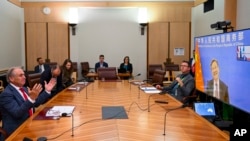Australia is hoping its trade dispute with China, which has affected billions of dollars in commodity exports, could be coming to an end after Beijing lifted tariffs on barley.
Trade restrictions imposed by China on a range of Australian goods, including coal, wine and beef, have been part of broader disputes between the two nations.
There has been diplomatic friction in recent years over democracy in Hong Kong, human rights, and Beijing’s ambitions in the South China Sea and the Pacific.
Last week, China’s commerce ministry said it would scrap its 80.5% tariffs on Australian barley.
Australia has insisted the restrictions were punitive and were “economic coercion,” although Chinese officials stressed there were sound technical reasons for the duties.
Australian Trade Minister Don Farrell is hoping that Beijing will soon lift similar sanctions on Australian wine exports to China.
"Our whole process over the last 15 months has been to try and stabilize our relationship with the Chinese government to get them to remove the trade impediments that have been a blockage in our relationship over period of time,"Farrell told the Australian Broadcasting Corp. Monday. "Bit by bit, that process has been working."
The Canberra government is challenging China’s tariffs of up to 212% on Australian wine at the World Trade Organization, which tries to regulate global commerce.
Chinese restrictions also remain on exports of Australian beef, cotton and seafood.
Farrell said China's Commerce Minister Wang Wentao agreed to visit Australia, although no details have yet been released.
Australian Prime Minister Anthony Albanese is expected to visit China later this year.
The trade of goods and services with China accounts for about a third of Australia’s global trade.
The China Australia Free Trade Agreement came into force in December 2015.
Australia is among China’s largest suppliers of commodities, including iron ore, a key ingredient in steelmaking.
The Canberra government has been seeking to diversify Australia’s international trade away from its heavy reliance on China to include other countries, such as India and Indonesia.




